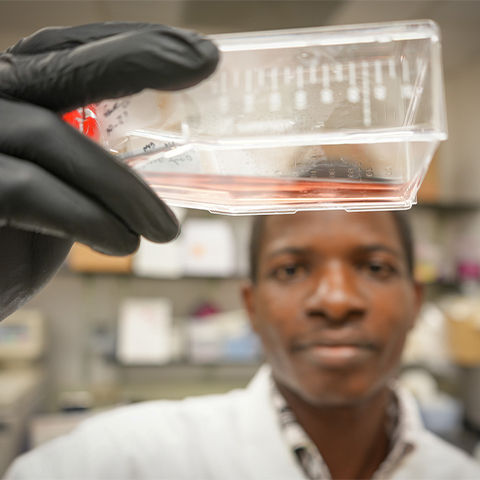Damilola's Educational Experience

Every summer, the Cornell Leadership Program welcomes veterinary students from around the world to the Ithaca campus for a hands-on 10-week experience in biomedical research focused on addressing important problems in animal health. Given that one of the foundations of our mission is the education of veterinary professionals, the Cornell Feline Health Center is proud to be able to support Leadership students who work on feline-focused projects.
We are happy to report that Damilola Gbore, a sixth-year veterinary student from the University of Ibadan in Nigeria, is the 2023 recipient of Leadership Program financial support from the Center.
Born and raised in Akure, a city in Southwestern Nigeria, Gbore is the youngest of four boys from a close-knit family. His deep-seated interest in animal biology and commitment to promoting animal and human health led him to enroll in the veterinary program at the University of Ibadan.
Gbore's motivation to apply for the Cornell Leadership Program stemmed from a fellow student's experience in the program in 2020, sparking his interest in a career in biomedical research. Drawn to the scientific aspect of veterinary medicine, the Leadership program seemed like a perfect fit.
“The opportunity to have close interaction with a diverse cohort of participating scholars from different veterinary schools around the world is the feature I found most exciting about the program,” said Gbore. “This has greatly improved my multicultural exposure and provided me with networks from different parts of the world.”
Working under the guidance of Dr. Gary Whittaker, the James Law Professor of Virology, Gbore's research focused on Feline Infectious Peritonitis (FIP), a highly impactful disease caused by Feline Coronavirus (FCoV).

Photo: John Enright/Baker Institute
“FIP can be fatal if left untreated, and unfortunately, there is currently no FDA-approved medication for its treatment in the United States,” said Gbore. “Additionally, the lack of proper understanding of FCoV makes the diagnosis and management of the disease challenging.”
Gbore's dedication to his research extended beyond the laboratory techniques he employed, including nucleic acid extraction, PCR, Gel electrophoresis and qRT-PCR. His work also involved bioinformatic analysis of DNA sequencing results, which was used in the detection and characterization of FCoV in samples.
“The model being evaluated in this study may provide more comprehensive insights into the behavior of FCoV, paving a way for improved diagnostic and clinical outcomes in FCoV-infected cats, and reducing deaths among cats due to FIP,” said Gbore. “In addition, FCoV shares some similarities with other coronaviruses that impact human health, like SARS-CoV-2. Further insights into the biology of the virus may also help us understand more about other related human viruses, providing knowledge that can be used to investigate them more effectively.”
Looking ahead, Gbore plans to enroll in a Ph.D. program in infectious diseases and immunology after completing his veterinary degree. He envisions contributing to the development of diagnostics, antiviral drugs and vaccines against viral diseases that are important to both animal and human health, especially in his region.
Beyond the laboratory, Gbore appreciated the serene atmosphere of the Cornell University campus during the summer.
“I found the beauty of the nature in the area captivating, with its numerous waterfalls, vegetation, and deer,” shared Gbore. “My visit to Taughannock Falls during the 4th of July celebration and my first time kayaking at Stewart Park with some other scholars, among other exciting experiences, will always be memorable.”
Damilola Gbore's journey exemplifies the Cornell Feline Health Center’s commitment to fostering the careers of the next generation of veterinary scientific leaders. It also highlights our dedication to advancing research and making a lasting impact on feline health throughout the world.





